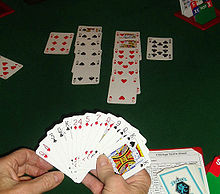
Oh hell or contract whist is a trick-taking card game of British origin in which the object is to take exactly the number of tricks bid. It was first described by B. C. Westall around 1930 and originally called oh! well. It was said to have been introduced into America via the New York clubs in 1931. Phillips and Westall describe it as "one of the best round games".

Whist is a classic English trick-taking card game which was widely played in the 18th and 19th centuries. Although the rules are simple, there is scope for strategic play.
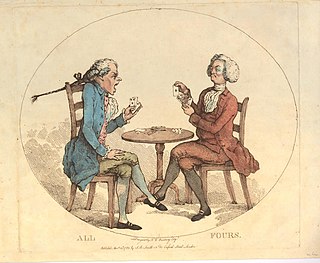
All fours is a traditional English card game, once popular in pubs and taverns as well as among the gentry, that flourished as a gambling game until the end of the 19th century. It is a trick-taking card game that was originally designed for two players, but developed variants for more players. According to Charles Cotton, the game originated in Kent, but spread to the whole of England and eventually abroad. It is the eponymous and earliest recorded game of a family that flourished most in 19th century North America and whose progeny include pitch, pedro and cinch, games that even competed with poker and euchre. Nowadays the original game is especially popular in Trinidad and Tobago, but regional variants have also survived in England. The game's "great mark of distinction" is that it gave the name 'jack' to the card previously known as the knave.
Ninety-nine is a card game for 2, 3, or 4 players. It is a trick-taking game that can use ordinary French-suited cards. Ninety-nine was created in 1967 by David Parlett; his goal was to have a good 3-player trick-taking game with simple rules yet great room for strategy.

Solo whist is the English form of Wiezen, a simple game of the Boston family played in the Low Countries. It is a trick-taking card game for four players in which players can bid to make eight tricks in trumps with any partner, or a solo contract playing against the other three players. Thus it combines both partnership and cut-throat play. Scoring is with small stakes won or paid out on each hand.
Pedro is an American trick-taking card game of the all fours family based on auction pitch. Its most popular variant is known as cinch, double Pedro or high five which was developed in Denver, Colorado, around 1885 and soon regarded as the most important American member of the all fours family. Although it went out of fashion with the rise of auction bridge, it is still widely played on the western coast of the United States and in its southern states, being the dominant game in some locations in Louisiana. Forms of the game have been reported from Nicaragua, the Azores, Niobe NY, Italy, and Finland. The game is primarily played by four players in fixed partnerships, but can also be played by 2–6 individual players.

Bid whist is a partnership trick-taking variant of the classic card game whist. As indicated by the name, bid whist adds a bidding element to the game that is not present in classic whist. Bid whist, along with spades, remains popular particularly in U.S. military culture and a tradition in African-American culture.
Pitch is an American trick-taking game equivalent to the British blind all fours which, in turn, is derived from the classic all fours. Historically, pitch started as "blind all fours", a very simple all fours variant that is still played in England as a pub game. The modern game involving a bidding phase and setting back a party's score if the bid is not reached came up in the middle of the 19th century and is more precisely known as auction pitch or setback.

Preferans or Russian Preference is a 10-card plain-trick game with bidding, played by three or four players with a 32-card Piquet deck. It is a sophisticated variant of the Austrian game Préférence, which in turn descends from Spanish Ombre and French Boston. It is renowned in the card game world for its many complicated rules and insistence on strategical approaches.
German whist is a variant of classic whist for two players in which the reward for winning the first 12 tricks is to add a particular card to your hand. Also called Chinese whist, it is probably of British origin.
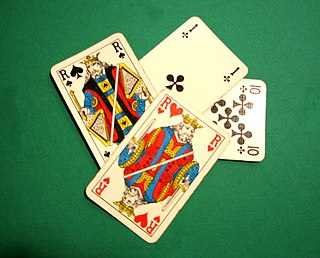
Clabber is a four-player card game played in southwestern Indiana near Evansville. It is a member of the Jack–nine family of point-trick card games that are popular in Europe and is similar to Klaberjass. The trump makers must score at least eighty-two points to keep from "going set", where they do not score any of their points. Additional points can also be scored for a combination of cards in a hand, which would assist in "making it", or, not going set.
Catch the ten, also called Scots whist or Scotch whist, is an 18th-century point-trick ace–ten card game that is recorded as being played only in Scotland, although evidence suggests a possible German origin. Unlike standard whist, it is played with a pack of only 36 cards, the fives and below being omitted. In the trump suit, the jack is the highest card. Despite its alternative name, it has nothing to do with standard whist.
3-5-8, also known as sergeant major for its popularity among members of the Royal Air Force, is a trick-taking card game for 3 players, based on whist, using a standard 52 card deck. 3-5-8 may be played as a gambling game, and there are many variations with names like "8-5-3" and "9-5-2" played throughout the world.
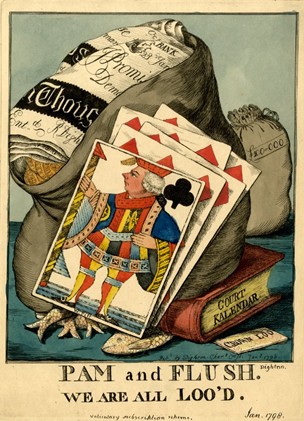
Lanterloo or loo is a 17th-century trick taking game of the trump family of which many varieties are recorded. It belongs to a line of card games whose members include Nap, euchre, rams, hombre, and maw. It is considered a modification of the game of "all fours", another English game possibly of Dutch origin, in which the players replenish their hands after each round by drawing each fresh new cards from the pack.

The card game of Euchre has many variants, including those for two, three, five or more players. The following is a selection of the Euchre variants found in reliable sources.
Court piece is a trick-taking card game similar to the card game whist in which eldest hand makes trumps after the first five cards have been dealt, and trick-play is typically stopped after one party has won seven tricks. A bonus is awarded if one party wins the first seven tricks, or even all tricks. The game is played by four players in two teams, but there are also adaptations for two or three players.

Tippen, also known as Dreiblatt, Dreikart, Drei Karten, Dreekort, Kleinpréférence or Labet, is an historical German 3-card, plain-trick game which was popular as a gambling game for three or more players. The Danish version of the game was known as Trekort and more elaborate Swedish variants include Knack and Köpknack. It appears to be related to the English game of Three-Card Loo. It was banned as a gambling game in some places.
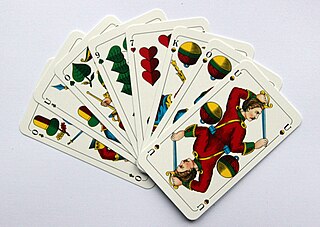
Mucken or Muck is a variation of the popular German card game, Schafkopf. However, unlike Schafkopf, it must always be played in teams of 2 players, so there are no soloist or Rufer ("caller") contracts. Mucken is mainly found in the province of Upper Franconia in the German state of Bavaria. Mucken is often played in Franconian restaurants, as it is part of the Franconian pub culture. The details of the rules vary greatly, even from village to village.
Call-ace whist or Danish whist is a card game for four players playing in variable partnerships. It is the most popular form of Whist in Denmark, where it is often just called "Whist". It has a well developed bidding system and has imported from the traditional Danish game of Skærvindsel the feature of determining the partnerships by 'calling an ace'. John McLeod records that there is also a version of Danish whist in which there are fixed partnerships.
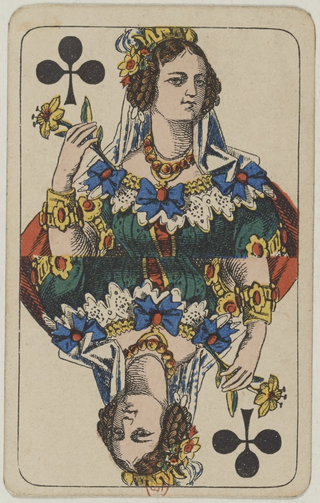
Sjavs is a Danish card game of the Schafkopf family that is played in two main variants. In Denmark, it is a 3-player game, played with a shortened pack of 20 cards; in the Faroe Islands, where it is very popular, it is a four-hand, partnership game using a standard piquet pack of 32 cards.
